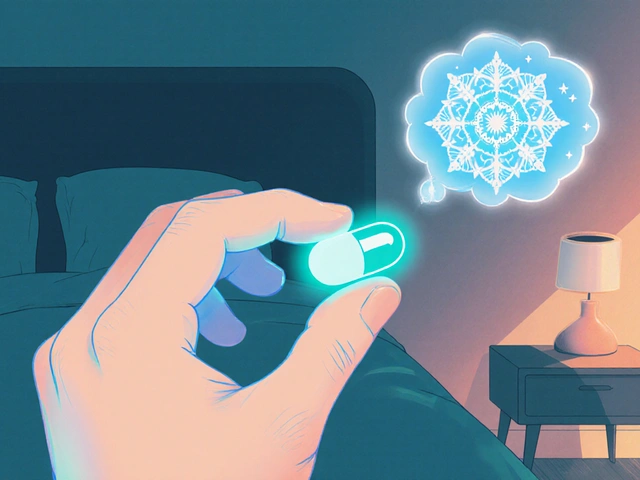Jock Itch and Sleep: Tips for a Comfortable Night's Rest
Understanding Jock Itch and Its Impact on Sleep
As a sufferer of jock itch, I understand the discomfort and irritation it can cause, especially during the night. Jock itch, also known as tinea cruris, is a fungal infection that affects the groin area, inner thighs, and buttocks. This common ailment can cause unbearable itching, burning sensations, and redness, making it difficult to get a good night's sleep. In this section, we'll delve into how jock itch can disrupt your sleep and discuss why it's essential to prioritize rest to promote healing.
When we sleep, our bodies work to repair and rejuvenate themselves. Unfortunately, the itching and irritation from jock itch can prevent us from getting the rest we need, leading to poor sleep quality and even insomnia. Moreover, poor sleep can weaken our immune system, making it harder for our bodies to fight off the infection. As a result, it's crucial to find ways to manage jock itch symptoms during the night to ensure a comfortable and restorative sleep.
Creating a Sleep-Friendly Environment
When dealing with jock itch, it's essential to create a sleep environment that minimizes the chances of further irritation. One significant factor to consider is the temperature of your bedroom. As the fungus that causes jock itch thrives in warm and moist environments, keeping your room cool and well-ventilated can help reduce the intensity of your symptoms.
Another crucial aspect to consider is your bedding. Opt for lightweight, breathable sheets and blankets made of natural materials like cotton or bamboo. These fabrics can help wick away moisture and prevent your body from overheating during the night. Additionally, make sure to wash your bedding regularly to maintain a clean and hygienic sleeping space.
Choosing the Right Sleepwear
The clothes you wear to bed can significantly impact your comfort level when dealing with jock itch. To minimize irritation and promote healing, select sleepwear made from soft, breathable materials like cotton. Avoid tight-fitting or synthetic fabrics, as these can trap moisture and exacerbate your symptoms.
Consider sleeping in loose-fitting boxers or shorts, as these can provide adequate ventilation without causing further discomfort. If you prefer sleeping without underwear, ensure your bedding is clean and fresh to prevent the spread of the infection.
Practicing Proper Hygiene Before Bed
Keeping the affected area clean and dry is essential when managing jock itch. Before going to bed, take a shower using a gentle, fragrance-free soap, and make sure to thoroughly rinse the groin area. Afterward, pat the area dry with a clean towel, taking care not to rub or irritate the skin further.
If you're using over-the-counter antifungal creams or ointments, apply them as directed after you've cleaned and dried the area. Remember to wash your hands thoroughly before and after applying any medication to prevent the spread of the infection.
Using Home Remedies to Soothe Symptoms
There are several home remedies you can try to help alleviate the itching and discomfort caused by jock itch, allowing you to sleep more comfortably. Some popular options include applying a cold compress to the affected area, dabbing on some witch hazel, or using over-the-counter hydrocortisone creams to reduce itching and inflammation.
Additionally, some people find relief by soaking in a warm bath with a few tablespoons of colloidal oatmeal or Epsom salts. These natural remedies can help soothe the skin and provide temporary relief from itching and irritation. However, keep in mind that these remedies should not replace proper medical treatment and should only be used as an adjunct to your doctor's recommendations.
Minimizing Stress for Better Sleep
Dealing with jock itch can be a stressful experience, and we know that stress can significantly impact the quality of our sleep. To help reduce stress and promote relaxation, consider incorporating relaxation techniques into your nightly routine. Activities like deep breathing exercises, meditation, or gentle stretching can help calm your mind and prepare your body for sleep.
Additionally, try to create a consistent sleep schedule by going to bed and waking up at the same time every day, even on weekends. This consistency can help regulate your body's internal clock and make it easier to fall asleep and stay asleep throughout the night.
When to Seek Medical Help
While jock itch is typically a minor and treatable condition, it's essential to know when to seek medical help. If your symptoms worsen, spread beyond the groin area, or don't improve after two weeks of self-care and over-the-counter treatments, it's time to consult a healthcare professional. They can provide a proper diagnosis and recommend prescription-strength treatments to help you find relief from jock itch and enjoy a comfortable night's sleep once again.
In conclusion, dealing with jock itch can be a frustrating and uncomfortable experience, especially when it comes to getting a good night's sleep. By following these tips and seeking medical help when necessary, you can manage your symptoms and improve your sleep quality, allowing your body to heal and recover effectively.




Javier Garcia
Jock itch makes it impossible to catch any Z's.
christian quituisaca
First off, kudos for tackling a topic that many shy away from because of the awkwardness surrounding it.
Sleep is the silent healer, and when a pesky fungus decides to set up camp in the groin, it throws the whole restoration process into chaos.
Keeping your bedroom cool is like sending the fungus on a vacation to the Arctic-temperature is its Achilles' heel.
Aim for a thermostat setting somewhere between 60 and 68°F (15‑20°C), and you’ll notice the itching subsiding overnight.
Ventilation matters too; a simple fan can circulate air and whisk away moisture that the fungus loves to feast on.
When it comes to bedding, think cotton or bamboo-natural fibers act like a sponge for sweat, wicking it away from the affected skin.
Even better, consider doubling up with a breathable mattress protector to add a barrier against lingering dampness.
Your sleepwear should be loose, breathable, and preferably cotton; ditch the spandex and synthetic blends that trap heat like a sauna.
If you’re comfortable, go commando at night, but always make sure the sheets are fresh; microbes love stale fabric.
A quick pre‑bed shower with fragrance‑free soap can cleanse the area, but remember to pat dry-rubbing can irritate the skin further.
Apply your antifungal cream right after drying; it works best when the skin is slightly damp, allowing better absorption.
Don’t forget to wash your hands after each application-prevention of spread is half the battle.
For a natural touch, a cold compress or a dab of witch hazel can quell the itch in a pinch, buying you precious minutes of uninterrupted sleep.
If you enjoy a warm soak, add a cup of colloidal oatmeal; just be sure to dry thoroughly before hopping into bed.
Stress is a silent aggravator; a brief meditation or some deep‑breathing exercises can calm the nervous system and, indirectly, reduce the perception of itch.
Finally, keep an eye on the timeline-if the rash doesn’t improve after two weeks of diligent care, it’s time to call your doctor for stronger prescription options.
Donnella Creppel
Honestly, who would've thought a fungal whiff could turn your night into a carnival of itchiness??!! It's practically a *fashion statement*-the red flare, the burning zest-*so* avant‑garde! Yet, dear readers, let us not forget the cardinal rule: *dryness* is the holy grail; moisture? *No*-it’s the nemesis!! Forget those cheap cotton blends; invest in bamboo-yes, bamboo, the *green* saviour of skin integrity. And, pray, do not neglect the subtle art of changing sheets weekly; otherwise, you’re basically hosting a fungal rave under your duvet.
Jarod Wooden
Within the epistemic lattice of dermatological resilience, the thermodynamic gradient of your sleeping enclave directly modulates the pathogenicity index of tinea cruris. By attenuating ambient humidity, you effectively diminish the mycelial proliferation curve, thereby truncating the itch‑signal cascade. Moreover, the bio‑mechanical interface between synthetic microfibers and epidermal keratinocytes escalates transepidermal water loss, exacerbating pruritus. Opt for hygroscopic textiles to re‑establish homeostatic equilibrium. In summation, these micro‑level adjustments precipitate macro‑level recuperative outcomes.
lee charlie
That makes sense – keeping the room cool and using breathable fabrics really does help the skin heal faster. It’s also good to remember to dry the area gently after a shower and to apply the cream while the skin is still a bit damp. Small habits add up to a big difference in comfort.
Greg DiMedio
Oh great, another lecture on cotton sheets. As if we didn’t already know that cotton is "the miracle fabric". Next you’ll tell us to breathe oxygen.
Badal Patel
Esteemed compatriots, permit me to articulate, with the gravitas befitting this discourse, that the very ambience of one's nocturnal domicile exerts a profound influence upon the mycological adversary that we confront. To disregard the thermic variables is to court disaster with unabashed temerity.
KIRAN nadarla
The preceding statement contains several grammatical inaccuracies: "exert a profound influence upon" should be "exerts a profound influence on," and "court disaster with unabashed temerity" is a tautology. Please revise for precision.
Kara Guilbert
Honestly, we should all just stop being so perfec... I mean, perfect about everything. If you can't even write a proper sentence, maybe just focus on the itch and not the grammar.
Sonia Michelle
I really appreciate all the practical tips shared here-especially the emphasis on breathable sleepwear and a cool room temperature. Those small adjustments can truly make a night feel less like a trial and more like genuine rest. Keep the advice coming!
Neil Collette
Oh, look, another earnest reminder to keep your bedroom at a "reasonable" temperature. As if the thermostat is the ultimate arbiter of fungal existence. News flash: fungus doesn't read your life advice columns.
James Lee
Sure, temperature is important, but you're missing the bigger picture-like, you know, actually seeing a doctor when home remedies fail. It's not all about setting the AC to "Arctic" and hoping the fungus gets a cold.
Dennis Scholing
Thank you all for sharing such a diverse range of experiences and advice. It’s encouraging to see how many practical steps we can take to improve sleep while managing jock itch. Let’s keep supporting each other with empathy and useful information.